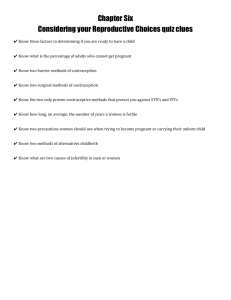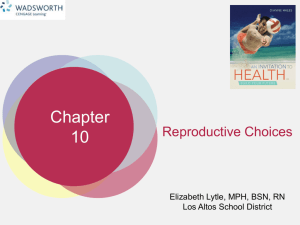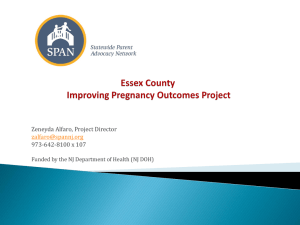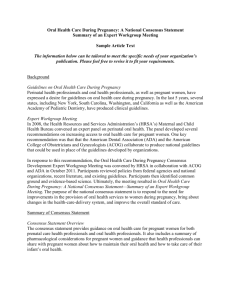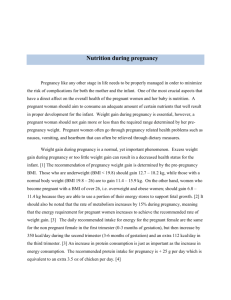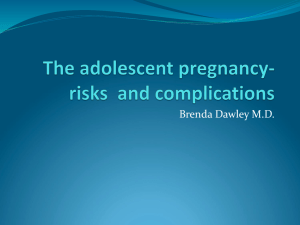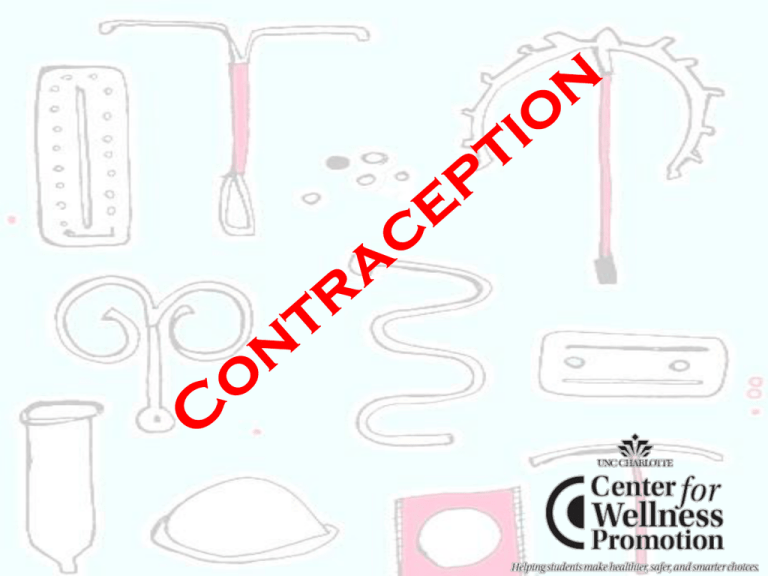
What is it?
• Contraception is any method or technique
used to prevent pregnancy
• Contraception can come in many different
forms
Implant (IMPLANON)
• An Implant is a single thin
rod placed under a the
skin on the woman’s
upper arm
• It releases progestin in
the woman’s skin over a
period of 3 years
• This does NOT protect
against sexually
transmitted diseases or
infections
0.5% Failure rate
*These methods do NOT protect against STI’s!!!
Intrauterine Device
(Paraguard or Mirena)
• An IUD is placed inside a
woman’s uterus to prevent
pregnancy
• It can stay in the uterus for 510 years
• This does NOT protect
against sexually transmitted
diseases or infections
• Paraguard does not have
hormones.
• Mirena does have hormones.
0.2-0.8% Failure rate
*These methods do NOT protect against STI’s!!!
Hormonal Methods
• Oral contraceptives or “the pill” is a
taken by a woman at the same time
each day to prevent pregnancy . Their
a many varieties of birth control pills,
thus talking to a doctor is key to
finding which one will be best for you!
9% Failure rate
• Injections or shots
(Depo-Provera) of
hormonal progestin may
be given to women by
their doctor every three
months to prevent
pregnancy.
6% Failure rate
*These methods do NOT protect against STI’s!!!
Hormonal Methods
• The patch is worn on a woman’s lower
abdomen, buttocks or upper body to
release hormones that prevent
pregnancy. The Patch is changed each
week. Patch locations should be rotated
to approved sites to prevent irritation.
9% Failure rate
• The contraceptive ring (Nuva Ring)
is placed inside a woman’s vagina
and replaced every 3 weeks. It
releases hormone progestin and
estrogen to prevent pregnancy.
*These methods do NOT protect against STI’s!!!
9% Failure rate
Barrier Methods
• Male condoms are worn by the
man and prevent sperm from
getting into the woman’s body.
• This method also DOES protect
against STD’s and STI’s.
18% Failure rate
• Female condoms are worn by the
woman and also prevent sperm from
getting into the her body
• It can be inserted up to 8 hours before
intercourse and may also protect
against STD’s and STI’s
21% Failure rate
Emergency Contraception
• Also known as the morning
after pill, emergency
contraception should only be
used after unprotected sex or
failed birth control.
• The pill must be taken within
72 hours of intercourse.
• This does not protect against
or cure STI’s.
Approximately 25% Failure rate
If you are already pregnant, Plan B
will not end the pregnancy.
• Myth: A female cannot get
pregnant the first time she
has sex.
• Fact: A woman’s
chances for getting
pregnant are always the
same.
• Myth: Douching,
showering or bathing can
prevent pregnancy.
• Fact: Douching does not
prevent pregnancy and
it is impossible to
douche, shower, or
bathe fast enough to
“wash away the sperm”.
• Myth: A female can’t get
pregnant while she is on her
period.
• Fact: Generally during a
woman’s period she is not
ovulating, but it is possible
to get pregnant during any
part of the menstrual cycle.
• Myth: A female can’t get
pregnant if a male “pulls
out” before he ejaculates.
• Fact: Once a male becomes
aroused, he ejects preejaculate fluid and
pregnancy is still possible
(this method may also be
hard to control.

